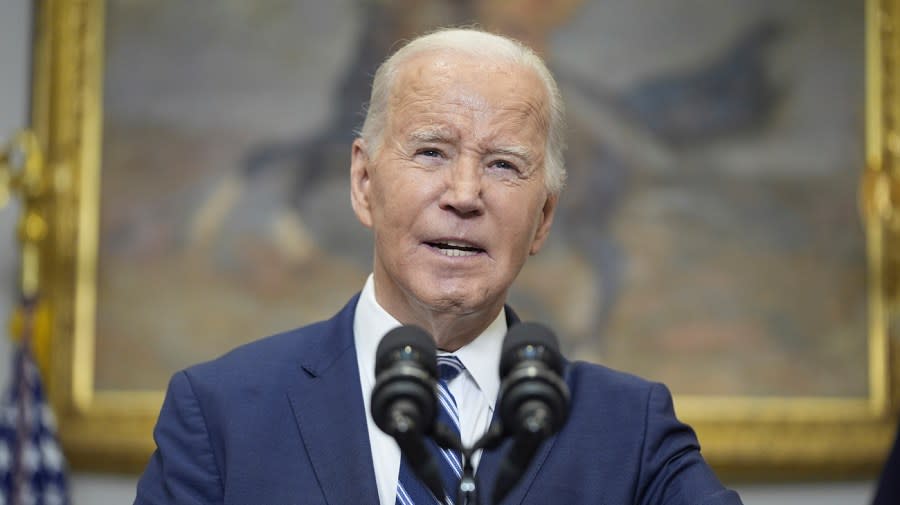Progressive group preparing $30M turnout effort ahead of November

- Oops!Something went wrong.Please try again later.
- Oops!Something went wrong.Please try again later.
- Oops!Something went wrong.Please try again later.
- Oops!Something went wrong.Please try again later.
A progressive PAC is preparing a $30 million investment into a large-scale turnout effort ahead of the November elections.
The Chicago-based Progressive Turnout Project (PTP), which was founded in 2015, is looking to rally “inconsistent” Democrats through a variety of voter contact efforts.
The organization will deploy methods like distributed organizing, postcard-sending, relational organizing, sending turnout mail remainders and other methods to boost turnout, a program that will cost between $30 million and $35 million, PTP’s President Alex Morgan said in a Wednesday interview with The Hill.
For PTP, there are four key priorities ahead of November: Help reelect President Biden for a second term; keep the current Senate majority; flip the lower chamber in the Democrats’ favor; and help out in some state-level races.
The PAC is going to make “significant” investments in seven states ahead of Biden’s possible rematch with former President Trump. The group will target Arizona, Georgia, Michigan, Pennsylvania, Wisconsin, Nevada and North Carolina, all likely to be battleground states in 2024.
The also organization plans to make its presence felt in Ohio, Texas and Montana Senate races.
They plan to “shore up” Sen. Sherrod Brown (D-Ohio), who has held the seat since 2007. He is one of the prime targets for Republicans who are hoping to flip back the upper chamber.
Trump carried the state in 2016 and 2020 and has endorsed businessman Bernie Moreno, one of three GOP candidates, along with Ohio Secretary of State Frank LaRose and state Sen. Matt Dolan, competing to become the nominee and take on Brown.
“We’re not just focused on the presidential race, we also are interested in and want to defend our Senate majority,” Morgan said.
In Texas, the PTP will back Rep. Colin Allred (D-Texas), the leading Democratic candidate hoping to unseat Sen. Ted Cruz (R-Texas), with Morgan calling it the “best pick-up opportunity for Democrats this cycle.”
“We don’t wanna entirely sit out Texas, because, you know, even though the chance may be small, it’s worth making some kind of investment there and seeing if we can make an impact,” Morgan said.
In Montana, Sen. Jon Tester (D-Mont.) is in a similar position to Brown, running for reelection in a state Trump won in 2020. Now up against businessman Tim Sheehy (R), a Trump-backed candidate, Tester will get some help from PTP, but he will need to “drive the message” since Montana is a “tricky” state.
“We are gonna support Jon Tester,” Morgan said. “We will be making contributions to his campaign. But you’re probably not going to see us run a lot of programs in a state like Montana.”
On the House side, the PTP will be active in swing districts of California and New York, looking to help oust Biden-district Republicans that helped the GOP secure the majority in the lower chamber. Since the House flipped red, the Republican majority has narrowed. This month, the GOP’s advantage shrunk even more after former Rep. Tom Suozzi (D) won back his old seat in this month’s special election.
The fourth priority for the PAC is state-level races. In a push to “diversify their programs” this year, the PTP will help with down-ballot contests, namely in New Hampshire and Minnesota.
“Those are places that maybe aren’t presidential or Senate battleground states for 2024 but that will have really consequential legislative races that will impact what their state houses look like,” Morgan said.
The PAC is looking to hire a little more than 6,000 people, who will knock on more than a million doors, according to Morgan.
In 2020, the PAC spent over $3.8 million on independent expenditures supporting Democrats on ballots, according to money-in-politics watchdog OpenSecrets.
Four years later, the organization shifted almost entirely from investing in independent expenditures to focusing on its “roots,” meeting and turning out voters on the ground.
“The real thing for us is are people even paying attention to those messages,” Morgan said. “I think we all know that people tune out at a certain point.”
“And so we think the best thing that we can do, and where we continue to believe there’s underinvestment in the Democratic Party is when it comes to field efforts. That’s why we put as much of our dollars as possible behind these direct voter contact efforts.”
For the latest news, weather, sports, and streaming video, head to The Hill.

